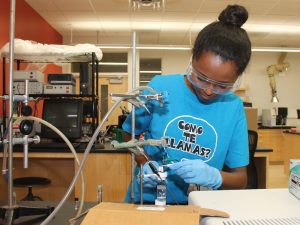 Science Lessons in Leadership
Science Lessons in Leadership
Austin College faculty in chemistry and biology have launched the Science Teaching and Research (STAR) Leadership program, enhancing all biology and chemistry courses through the intentional integration of leadership training into the coursework. Five key behaviors and skills are incorporated: interpersonal effectiveness, problem solving, collaborative work, foresight and planning, and moral consciousness. Students then have opportunities to apply and practice those behaviors in the class and to reflect on their effectiveness as leaders.
The guiding philosophy of the STAR Leadership program is that all thoughtful and scientifically trained people are called to lead at some point in their lives, and should be prepared to do so.
Faculty members recognize that, just as it takes time to develop as a scientist, it takes time to develop the skills necessary to be a leader. Students experience the intentional instruction of leadership behaviors in short, level-appropriate activities in the classroom and are asked to enhance those skills throughout their undergraduate career. Behaviors are built upon as students move through advanced biology and chemistry coursework and participate in departmental research.
The program is supported by the W. M. Keck Foundation. For information, contact, Stephanie Gould, STAR program director and associate professor of chemistry. Read more on the STAR Website.
New Career Paths Open Through Additional Areas of Study
“Several additions to the Austin College curriculum as of Fall Term 2014 broaden program offerings for students and allow additional opportunities for finding the careers of their choice,” said Sheila Amin Gutiérrez de Piñeres, vice president for Academic Affairs. These new majors build on the strengths of the Austin College curriculum and faculty.
A major in business now has two tracks: finance and general business administration; a minor in accounting also is added to the Department of Economics and Business Administration.
 The Austin Teacher Program now offers an undergraduate minor in education to help students matriculate into the graduate degree more quickly. In addition, the opportunity to take three graduate classes as undergraduates reduces the number of courses from nine to six to be paid for in the Austin Teacher Program graduate year, a savings of approximately $15,000. Participants can graduate with the B.A. degree and Master of Arts in Teaching degree in 4.5 years.
The Austin Teacher Program now offers an undergraduate minor in education to help students matriculate into the graduate degree more quickly. In addition, the opportunity to take three graduate classes as undergraduates reduces the number of courses from nine to six to be paid for in the Austin Teacher Program graduate year, a savings of approximately $15,000. Participants can graduate with the B.A. degree and Master of Arts in Teaching degree in 4.5 years.
A new interdisciplinary minor in neuroscience includes courses from biology, psychology, and philosophy departments to build a foundation for understanding the study of the brain and nervous system from molecules to behavior and thought.
A new major and minor in public health promote a multidisciplinary approach to studying the ways of preventing disease, promoting health, and prolonging life. Students will gain an understanding of the nature of the scientific approach, the importance of statistical analysis, and the effects of social, economic, behavioral, political, and cultural factors on health.
